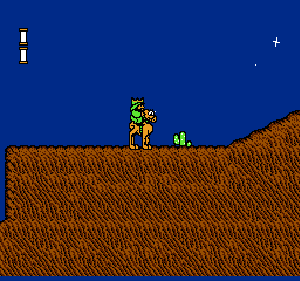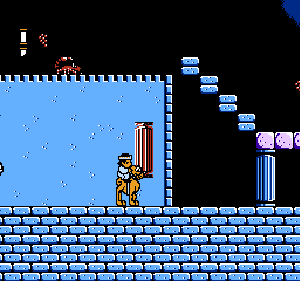 I often find myself a latecomer to game franchises. It sort of just happens that way. For example, my first Metal Gear game was Metal Gear Solid 2, followed by 3. It's been only recently that I went back to play the first Metal Gear Solid. My experiences with the Silent Hill series have been similar. Walk in to a used game store (at least in the great state of Missouri) and there is a decent chance you'll find a $10 used copy of Silent Hill 2. You're going to have to look hard for anything else. 3 is noticeably vacant. The Room is abundant on the Xbox, but I've sworn off of Xbox games based on my prior experiences with the 360's shoddy emulation. Meanwhile, if you DO find a copy of the original Silent Hill, be prepared to pay upwards of $50. So when I found Silent Hill 3 at my local Game XChange (after me and my friends narrowly escaped death from tornadoes that turned out to not actually be there), I bought that shit in an instant. I'm sure completing an entire game in a single day is wildly unhealthy. I was surprised that I was able to finish the game in just under 7 hours. Surprised, but not really disappointed.
I often find myself a latecomer to game franchises. It sort of just happens that way. For example, my first Metal Gear game was Metal Gear Solid 2, followed by 3. It's been only recently that I went back to play the first Metal Gear Solid. My experiences with the Silent Hill series have been similar. Walk in to a used game store (at least in the great state of Missouri) and there is a decent chance you'll find a $10 used copy of Silent Hill 2. You're going to have to look hard for anything else. 3 is noticeably vacant. The Room is abundant on the Xbox, but I've sworn off of Xbox games based on my prior experiences with the 360's shoddy emulation. Meanwhile, if you DO find a copy of the original Silent Hill, be prepared to pay upwards of $50. So when I found Silent Hill 3 at my local Game XChange (after me and my friends narrowly escaped death from tornadoes that turned out to not actually be there), I bought that shit in an instant. I'm sure completing an entire game in a single day is wildly unhealthy. I was surprised that I was able to finish the game in just under 7 hours. Surprised, but not really disappointed.The two Silent Hill games I have played have kept me coming back as a result of expert presentation. The music, visuals, and story are what allows the game to vastly excel over it's often weaker gameplay aspects. One of the most defining aspects of this presentation is the music and it's relation to the events on screen. Team Silent composer Akira Yamaoka obviously understands something that I wish more composers, both in video games and in cinema, would catch on to: sometimes the best music for a scene is little or no music at all. Silent Hill 3 is a game with no shortage of tense battles and utterly disturbing moments. I think one of the things that sets Team Silent apart from the rest is that in most games, you'd expect some rousing John Williams-esque orchestral score, perhaps with some guitars and latin chanting to accompany these scenes. In Silent Hill, you're often treated to little more than a pulsating background noise. It's brutally effective for conveying the chillingly surreal, dream logic-contingent world of Silent Hill. I think Yamaoka's skills also lie in variety as well, which serves to add emotional depth to the games. He sets the intense mood for the game with the hard rock opener You're Not Here, while tracks like End of Small Sanctuary give us a break from the paralyzing horror of the game.
The variety in music definitely helps, because the game changes environments quite often. In addition to the area's around Silent Hill, the game often lapses into the "Other World", a rusted, shit covered nightmare version of the real world. You could be cynical and say that the Other World concept largely exists as a means to reuse the same maps with different textures, but sometimes great gameplay design is born from budgetary constraints. The change is often times jarring and unsettling, and I think in many ways more effective than in Silent Hill 2. For example, the hospital in Silent Hill 3 becomes a fiery red throbbing mass where you'll find yourself running against the walls in order to find out where the hell you are. As usual, Team Silent's fetish for rusted grates and fans are more than present. It all contributes to this grimy, cerebral universe that really makes the series is so great.
In some ways, however, the story is a step down from it's predecessor. Silent Hill 2's deeply personal story is, in my opinion, almost unrivaled in the gaming industry. And Silent Hill 3's is definitely an interesting endeavor. A tale of a girl with a connection to the mysterious town that draws her back in after years of absence. It's a story that definitely works, but it very rarely surprises. There aren't many twists and startling revelations to be had when compared to the original. It's a largely straight forward horror story. And that's good, really. I found myself liking Heather by the end of the game, but the same level of obscurity just isn't there. And I'm not sure that's really a mark against it. It's really just something to mention.
As I ready myself to play Homecoming, the newest entry in the series, I'm finding myself tallying the differences between 2 and 3 and 4, and wondering how much Homecoming will build upon it. But ultimately, it's really only the presentation that I'm thinking about. Much like a point and click adventure game, I'm not looking for game play advancements in this series. They'd be nice, but as long as Double Helix supplies the same interesting level of presentation that Team Silent has maintained over the last few years and hopefully takes it to new places, I have high hopes.
9/10












